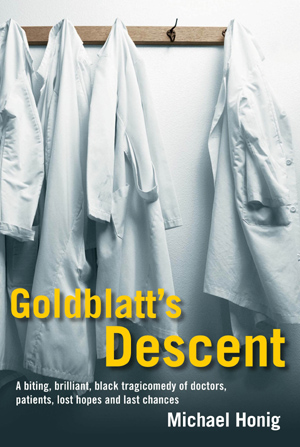
When we are admitted to hospital, as eventually most of us will be, we hope to be treated not only with technical competence but with kindness and compassion. Hope, however, is not the same as expectation, and there are enough tales of inhumanity in our hospitals to make us tremble at the prospect of admission.
This novel, written by a former hospital doctor, and which I suspect is strongly autobiographical, is a satire on the way in which common humanity is drained from doctors by a combination of the system of medical training and the organisation of the National Health Service. It portrays not the truth, but an important part of the truth; and it is no criticism of satire that it takes the part for the whole. There is no such thing as balanced satire.
The protagonist of the book is Malcolm Goldblatt, a very clever man and excellent doctor who, however, blights his own career by refusing to do the things expected of any doctor who wants to get on in the profession, for example kowtowing to eminent mediocrities that any conformist system often raises to heights of eminence.
One of the latter is Professor Small, a specialist in a rare and unimportant fictional disease called Fuertler’s Syndrome, for whom Dr Goldblatt works as a locum. Prof., as she is known, is a woman of slight ability and deep inner security, who has risen in the world partly by chance and partly by a shrewd understanding that one way to hide her deficiencies is to specialise in a disease so arcane and so unimportant that no one else is interested in it. Her chair is awarded to her not because of academic brilliance, but because the voluntary foundation devoted to Fuertler’s Syndrome offers to pay for it and will take its money elsewhere if refused. The Prof.’s scientific research is not above the intellectual level of train-spotting; and thus the sheer venality of modern academic life, at least in medicine, is exposed.
Prof. Small is an excellent portrait of hyperspecialised futility and careerism. Indeed, the careerism inherent in the present medical system is the main target of the satire; the doctors in the hospital behave more like members of a Politburo struggling for ascendency than humanitarians wanting to do good or reduce suffering.
Some of the satire is slightly out of date. For example, the junior doctors are exhausted to the point of automatism by the long hours they work, hoping against hope that patients will die in the ambulances that are bringing them to hospital and thus relieving them of pressure. Thanks to the European Working-time Directive junior doctors no longer work such long hours; but the change has wrought a different evil: patients are now passed between relays of doctors like hot potatoes, the principal aim of the doctors being that any patient should not die on their shift. This is not a system that makes for humane practice of medicine.
The intrigues of the doctors are portrayed minutely and very accurately: the novel is clearly the work of an insider, or former insider. As a doctor, I recognised everything in this book, but I find it difficult to say whether it would have quite the same meaning for, and impact on, a layman. And though the book is easy to read, it is too long and might have benefitted from editorial pruning.
In the end Dr Goldblatt despairs of advancement in the profession, which is unforgiving of his kind intellectual honesty and failure to conform, and he leaves it to its implied detriment. Dr Goldblatt, after all, is not only clever but, in his own way, extremely dedicated; medicine will be the poorer without him. The question arises whether ’twas ever thus; I suspect that there was once a much greater tolerance of eccentricity and non-conformity in medicine than there is now, when everything that is permitted is obligatory and everything that is not required is forbidden.
The title implies that Goldblatt is a kind of martyr, whose descent is from the cross upon which the profession of medicine has nailed him. I cannot quite decide whether this is moral grandiosity or an accurate assessment of reality. Such ambiguity is desirable in the depiction of the world: it forces us to think.

